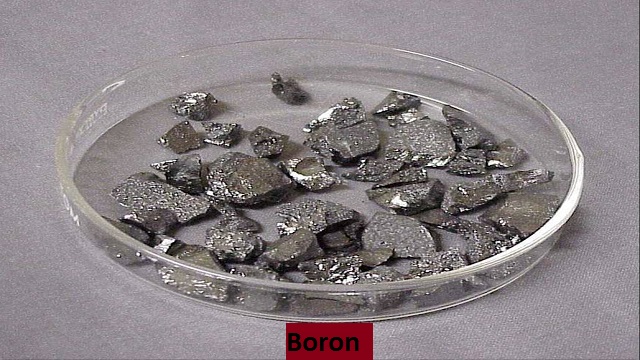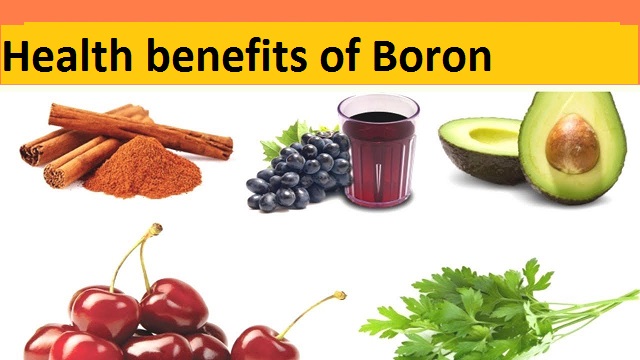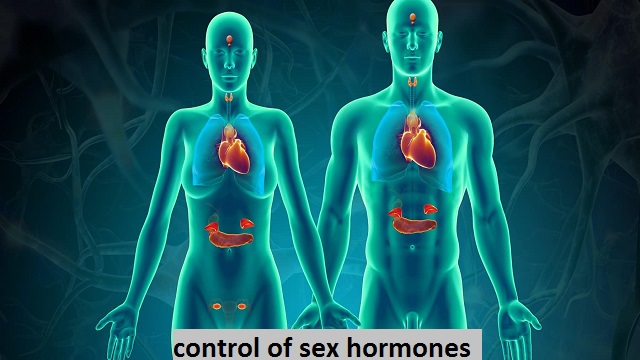
What is Boron?
It is an amorphous brown powder and a brittle, dark, lustrous metalloid in its crystalline form. The boron group’s lightest element, has three valence electrons that allow it to form covalent bonds, leading to a variety of compounds like boric acid, sodium borate, and the extremely hard crystals of this carbide.
Boron Has Impressive Benefits.
Boron is a trace mineral, but it is anything but dull. In terms of human health and perhaps even the evolution of life, it plays a variety of fundamental and important roles. Numerous medical conditions, including osteoarthritis, hormonal health, bone health, and wound healing, have been researched and tested for using this.
How Does Boron Work?
Among the many foods that naturally contain boron are beans, whole grains, avocados, nuts, fruit, and berries. This is a trace mineral that is not necessary for human health. Boric acid is the main form of its that you get from food. Combining this, hydrogen, and oxygen results in boric acid.
Where Can I Find Boron?
Although it is present in some body tissues, it tends to accumulate in the body’s bones, nails, and hair. A wide range of foods and drinks contain this, of which the body can absorb between 85 and 90 percent.
In its dietary form, fruits, tube and root vegetables, and different legumes are the main sources of this. The quantity is significantly influenced by the levels of boron in the soil and water used for the plants’ cultivation.
The advantages of supplemental boron for health are as follows.
Some of the most frequently cited health advantages of boron are listed below.
- Growth and maintenance of bones are supported by this.
- It has calming and soothing qualities.
- A wound’s ability to heal is helped by this.
- The mineral of this supports brain health.
The body uses sex hormones better when it has enough iron, and men’s testosterone levels benefit most.These health benefits are truly amazing, according to the claims. Let’s examine some of the data and evidence that are currently available for each of them, though, just to be sure.

The advantages of boron.
On the advantages and applications of this, research is conflicting. However, a number of studies have suggested that boron may benefit the treatment of osteoarthritis, the recovery of wounds, the growth of bone, and the regulation of hormones.
May Help Osteoarthrosis (OA):
Osteoarthritis is a degenerative condition that gets worse over time and frequently causes mechanical problems and chronic pain. This is brought on by the breakdown or structural change of the cartilage and other tissues found within the joint.
According to epidemiological data, this supplementation may be a successful treatment for osteoarthritis. In fact, the estimated incidence of arthritis ranges between 20 and 70 percent in areas where boron intake is greater than or equal to 1 mg per day. The estimated incidence of arthritis ranges from 0% to 10% in regions where boron intake is typically 3–10 mg per day.
Because of its anti-inflammatory properties, calcium fructoborate, a naturally occurring boron-carbohydrate complex derived from plants, has been shown to have positive effects on osteoarthrosis. A 62–70% pain reduction was seen in the first eight weeks of treatment in an 8-week pilot study of patients with mild to moderate OA.
Eight weeks into treatment, ibuprofen, a nonsteroidal anti-inflammatory drug (NSAID), had a 67 percent success rate in patients who had stopped using it due to its impressive analgesic effects.
Might enhance bone health.
In order to absorb calcium and magnesium and to stop bone demineralization, this is essential. This supplementation has repeatedly been shown to increase serum levels of estradiol and calcium absorption in peri- and postmenopausal women and to significantly reduce the amount of calcium and magnesium that is excreted in the urine.
In the human body, bones contain about 60% of the magnesium, which is essential for the metabolism of calcium.
Increased magnesium intake has been shown to increase bone density by maintaining skeletal muscle mass, thereby reducing the risk of bone fragility and age-related diseases like sarcopenia and osteoporosis.
The most prevalent mineral in the human body, calcium, contributes significantly to the formation of your bones and teeth. To create and maintain strong bones, you need calcium.
A steroid-like vitamin called vitamin D is also necessary for calcium absorption and bone mineralization, which raises bone density in general. The use of vitamin D is additionally positively impacted by this. Studies have shown that vitamin D supplementation can increase muscle strength, which in turn helps to reduce the risk of falls, one of the leading causes of fractures.
Keeping blood phosphorus levels stable is another critical process for building and maintaining strong, healthy bones, and vitamin D helps with this.
Supports the Maintenance of Hormonal Balance.
This affects the synthesis and function of steroid hormones. Boron affects the production and levels of sex hormones in both sexes, including progesterone, androgens like testosterone, and estrogen, according to a large body of research.
In a previous study from 1987, it was discovered that postmenopausal women on a low boron diet had significantly higher serum levels of testosterone and estradiol (E2) after taking this supplements, especially if their diets were high in magnesium.
Similar findings and an increase in male hormones were discovered in a 1997 study, which was carried out ten years later. Researchers discovered that this produced significant increases in free testosterone, which increased from an average of 11.83 pg/mL to 15.18 pg/mL after just one week, and significant decreases in serum estradiol, which decreased from 42.33 pg/mL to 25.81 pg/mL after only one week of this supplementation at 6mg per day.
The men’s plasma estradiol levels were significantly lower, which points to a higher rate of conversion of total testosterone to free testosterone in the testosterone metabolic pathway.
Could Facilitate Wound Healing:
Most wounds heal naturally without the need for medical attention. However, chronic wounds may also be accompanied by slower healing, inflammation, and ongoing tissue degradation.
Research on the use of boric acid as a potential treatment has revealed that boron compounds have remarkable antimicrobial effects against bacteria, yeast, and fungi in addition to significantly increasing cell proliferation, migration, vital growth factor, and gene expression levels in dermal cells.
Deficiencies in boron and vitamin D.
In one study, observational evidence showed that patients taking this supplements had harder to cut through bones than those taking no supplements. Additionally, It contributes to the bioavailability of vitamin D, which is important for calcium absorption and bone strength. Vitamin D deficiency is a problem that can be solved by this.
This supplementation has been demonstrated to stimulate bone growth in animals lacking in vitamin D, which is a promising finding despite the fact that more research, clinical trials, and meta-analyses need to be done.
Inflammatory response to boron.
An important function of inflammation in our bodies is that it is a typical and essential immune system response. In addition to assisting the healing process after an injury, it is essential to help fight off infections and other pathogens.
For those who suffer from arthritis, It can be a useful supplement option and can help lessen general discomfort.
Other Boron Effects.
It has demonstrated calming effects that aid in reducing inflammatory biomarker levels in the body. A biomarker used to assess inflammation in the body, C-reactive protein, was significantly lowered in one clinical trial among participants who received additional this.
Wound Healing and Boron.
The healing of wounds may also involve the use of this. One explanation is that it helps to produce collagen, a structural protein essential for the maintenance of skin, bone, and other tissues. Studies have also demonstrated that boron can promote the growth of macrophages, which are white blood cells (WBC) that consume bacteria.
Due to their role in triggering the immune system, macrophages are essential for wound healing. They also support the removal of dead cells, the inflammatory response to wounds, and tissue regeneration.
Cognitive Processes and Boron.
There have been connections between boron supplementation and cognitive function, despite the paucity of studies.
For instance, a study by Environmental Health Perspectives that was published found that participants who received a boron supplement intake of 3 points 25 mg per day performed better in areas of cognitive performance than those with low boron intake have.
- more effective hand-eye coordination.
- lengthen the perception and attention span.
- memory, both short- and long-term.

Boron and the control of sex hormones.
The two main sex hormones, testosterone and estrogen, may both be affected by this. It is believed to play a significant part in helping to regulate the natural production of testosterone and estrogen.
The results of ongoing clinical trials and studies on the effects of this on hormone regulation are still promising. One study examined the effects of this supplementation (6 mg/day) in male participants after a week.
Boron-containing foods include.
Your diet contains a variety of foods that naturally contain boron. However, dietary patterns and soil boron concentrations can have a significant impact on daily intake. In the US, boron intake ranges from 1 to 7 milligrams (mg) per day on average.
One to three milligrams of this per day can be obtained from a varied, high-plant diet. Among the foods high in boric acid are nuts, leafy greens, legumes, fruit, and avocados. Peanuts, raisins, prunes, pecans, apples, potatoes, and peaches are some of the best sources.
Dosage and negative effects of boron.
3 mg/day is the recommended and prescribed dosage to support bone health and stop the loss of bone mineral density. The daily intake for Americans ranges from 1 to 7 mg. Although there is no recommended daily intake for this, the maximum dose that is tolerable is 20mg.
The World Health Organization states that 1 to 13 mg of supplemental boron per day is an acceptable safe range. 6mg per day is typically used in clinical trials.
It is may be toxic and result in negative side effects if an excessive amount is consumed.
- Headache.
- Restlessness.
- Weariness.
- Indigestion.
- Dermatitis.
- kidney damage.
- a decrease in appetite.
What Negative Effects Can Too Much Boron Have?
Symptoms of excessive boron intake include:
- Nausea
- Vomiting
- Indigestion
- Headache
- Diarrhea.
Skin flushing, convulsions, tremors, vascular collapse, and even fatal poisonings in adults have all been reported at higher doses. Those who have hormone-sensitive diseases like breast cancer, endometriosis, and uterine fibroids may suffer negative effects from boron supplements or high dietary boron intake, according to the National Institutes of Health (NIH).
In some people has been linked to an increase in the production of hormones like testosterone and estrogen.It has also been demonstrated that boron supplementation reduces blood phosphorus levels. Make sure to first consult your doctor if you’re considering taking this. It is crucial to realize that delaying or forgoing standard care while self-treating a condition could have harmful consequences.
Read More: Complete Vegan Plant Protein
Leave a Reply